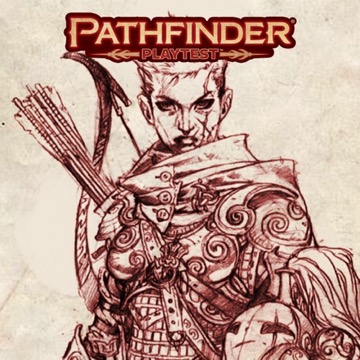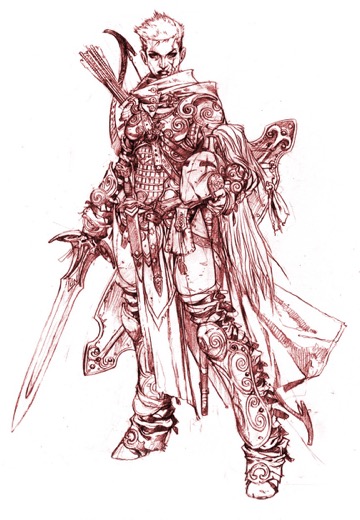Over the years, we have added a wide variety of new rules to Pathfinder First Edition, but none has been so well received as archetypes. It's no surprise that archetypes found such universal appeal. Allowing you to play a more specialized character, they let you play the character you want to play in a way that a single class often cannot support.
When the time came for us to look at archetypes for the Pathfinder Playtest, we knew that we wanted to make them a more integral part of the game, built to be an option from the very beginning. We also wanted to open them up a bit, so we could build archetypes allowing more than one class to access their features and feats, as opposed to having to recreate a concept for every applicable class with an entirely new archetype. This doesn't prevent us from creating more specific archetypes as well, but it opens up the design space further. In opening archetypes up, we realized that they might be easily abused if a player dipped into a variety of archetypes just to grab the best rules bits to make an overpowered character. It was a tough set of challenges, but fortunately for us, the answer was already built into the game.
Archetypes in the Pathfinder Playtest consist of a series of feats you can choose in place of your class feats. Every class gets its feats at roughly every other level, making them a perfect cost for archetypes. So if an archetype appeals to you—say, the pirate archetype—the only thing you need to do to gain access to it is take the appropriate dedication feat. Each dedication feat gives you some basic abilities and adds all the rest of that archetype's feats to your list of available class feats. The only catch is that you cannot take another dedication feat until after you have taken a specified number of archetype feats from the first one. So you can dip into a single archetype without too much trouble, but if you want more than one, you really have to put a fair amount of your character into the concept. For example, let's take a look at the pirate archetype.
Pirate Dedication Feat 2
Archetype, Dedication
Prerequisites Dexterity 12, trained in Acrobatics and Sailing Lore
When you Balance aboard a ship, treat a success as a critical success. You also ignore any difficult terrain, uneven ground, or incline caused by the ship's movement. You are trained with the hatchet, scimitar, and spear. In addition, Acrobatics is a signature skill for you.
Special You cannot select another dedication feat until you have gained two other feats from the pirate archetype.
As you can see, this first feat gives you a fair number of advantages while on a boat, certainly helping should combat break out, but you need to take more pirate feats before you can pick up another dedication feat. Let's take a look at two that you might choose.
Sea Legs Feat 4
Archetype
Prerequisites Pirate Dedication, trained in Athletics
Athletics is a signature skill for you. Whenever you succeed at an Athletics check to Swim, treat your result as a critical success. Additionally, you can always hold your breath for a number of actions equal to double your Constitution score when in water (this is not increased by using the Breathe Deep action).
Sea Legs really helps when you are in the water, letting you swim faster and hold your breath longer. It's also a prerequisite for Roll with the Ship, a feat that lets you reroll your Reflex saves when you are on your ship!
[[AA]] Boarding Action Feat 6
Archetype
Prerequisites Rope Runner
Swing on a rope or Stride up to twice your Speed. As long as you either boarded or disembarked a boat during this movement, make a Strike and deal an extra die of damage if you hit.
Boarding Action is one of those feats that nearly every pirate can be expected to have, since setting yourself up to board and pillage the enemy ship is going to be vital! It lets you close the distance to your foes, and if you move from one ship to another during this move, you can make a strike that deals extra damage! It's a bit more limited than the fighter's Sudden Charge, but you deal bonus damage as a benefit if you pull it off.
The pirate archetype has six feats to choose from (in addition to the dedication feat), which gives you plenty of variety if you are looking to explore the archetype before heading to the next one. The great part is that these pirate feats are part of your options list for the rest of your character's career, so you can always go back to pick up a feat that you missed.
Lastly, I want to take a look at prestige archetypes. These are archetypes whose dedication feats come with some pretty hefty prerequisites you have to meet before you can select them. In the Pathfinder Playtest Rulebook, we included only one such archetype as an example for you to play around with in your campaign: the Gray Maiden. Take a look at this dedication feat.
Gray Maiden Dedication Feat 6
Archetype, Dedication, Prestige
Prerequisites Strength 16, expert in Fortitude saves, trained in heavy armor and all martial weapons, member of the Gray Maidens
Your Gray Maiden training has steeled you against harsh physical conditions. You become a master at Fortitude saves. When you succeed at a Fortitude save, treat it as a critical success. You also gain access to special armor: Gray Maiden plate. Gray Maiden plate is a level 3 item that costs 600 sp, grants +7 AC and +3 TAC, and has a Dexterity modifier cap of +0; otherwise, it uses the same stats as full plate.
Special You cannot select another dedication feat until you have gained two other feats from the Gray Maiden archetype.
Becoming a master at Fortitude saves is not something you can easily do in most classes; in fact, level 6 is sooner than even a barbarian can manage, and that armor is some of the best you can find. Of course, joining the Gray Maiden organization is no simple feat either. Once you are in, this prestige archetype includes a variety of powerful feats that you can add to your character. Here is just a taste.
Unbreakable Feat 8
Archetype
Prerequisites Gray Maiden Dedication
You can endure a staggering amount of punishment. Increase your maximum HP by your level, increasing as you gain additional levels. You die at dying 5, or dying 6 if you also have Diehard.
This grants many of the benefits of the Toughness and Diehard general feats combined, and it stacks with both to make an incredibly resilient character.
That wraps up our look at archetypes. You'll find a number of them in the Pathfinder Playtest Rulebook, and we can't wait for you to give them a try. And come back on Monday for a massive blog that I am sure will resonate with many of you!
Jason Bulmahn
Director of Game Design


